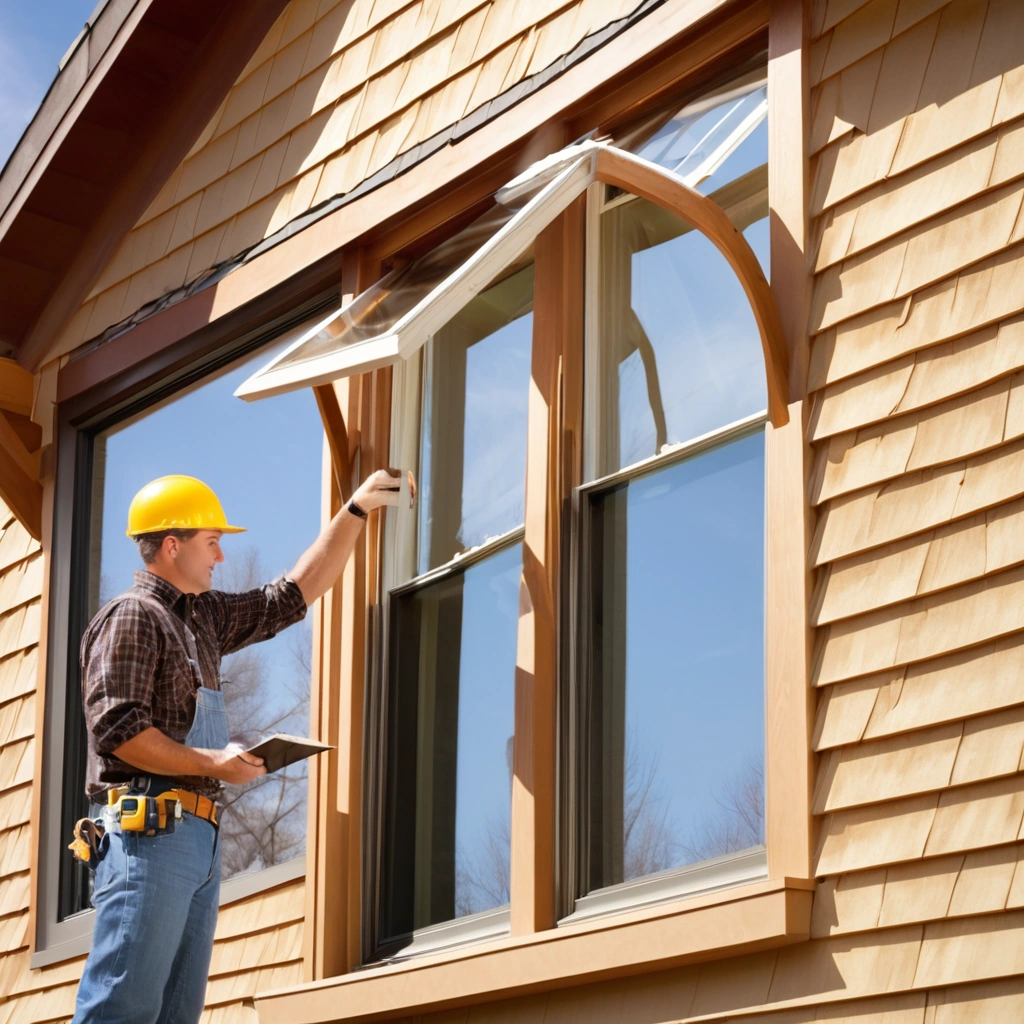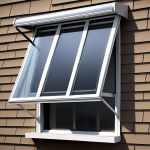Denver Homeowners Guide: Maximizing Window Replacement ROI – A Comprehensive Analysis of Cost, Energy Efficiency, and Property Value Enhancement
Introduction: Denver’s Window Replacement Landscape
In the dynamic housing market of Denver, Colorado, homeowners are constantly seeking ways to enhance their property value while reducing long-term expenses. Window replacement projects stand out as a significant investment, offering a compelling blend of aesthetic appeal, energy efficiency, and potential for increased Denver home value. However, navigating the complexities of window materials, energy-efficient features like Low-E coatings and gas fills, and the nuances of window installation Denver can be daunting. This comprehensive guide aims to provide Denver homeowners with a detailed analysis of window replacement ROI, exploring the factors that influence returns, available incentives such as Xcel Energy rebates, and actionable advice for making informed decisions.
We will delve into the past decade (2010-2019) where applicable, to provide relevant context. Understanding the Denver window replacement landscape is the first step toward a successful and financially sound home improvement project. Denver’s unique climate, characterized by intense sunlight, significant temperature fluctuations, and occasional extreme weather, necessitates careful consideration when selecting replacement windows. The choice between vinyl windows Denver, wood windows Denver, and aluminum windows Denver is paramount, as each material offers distinct advantages in terms of insulation, durability, and maintenance requirements.
For instance, while wood windows offer superior aesthetic appeal and insulation, they demand regular upkeep to prevent rot and warping, a crucial consideration given Denver’s dry climate and intense sun exposure. Conversely, vinyl windows Denver provide a cost-effective and low-maintenance alternative, although their aesthetic appeal may not match that of wood. Aluminum windows Denver, known for their durability, may not offer the same level of thermal performance as wood or vinyl, potentially impacting energy efficiency.
Furthermore, the ROI of energy-efficient windows Denver extends beyond immediate energy savings. Upgrading to Energy Star windows can significantly reduce energy consumption, leading to lower utility bills and a smaller carbon footprint. However, the impact on Denver home value is also a crucial consideration. Studies have shown that homes with energy-efficient upgrades, including window replacement, often command higher prices in the Denver real estate market. Potential buyers are increasingly aware of the long-term cost savings and environmental benefits associated with energy-efficient homes, making window replacement a strategic investment for homeowners looking to maximize their property’s value. By carefully evaluating the upfront costs, potential energy savings, and impact on home value, Denver homeowners can make informed decisions about window replacement and achieve a favorable return on investment.
Factors Influencing Window Replacement ROI
Several factors impact the ROI of Denver window replacement projects, extending beyond the initial sticker price. The upfront investment, encompassing the cost of the windows themselves, professional window installation Denver, and any associated disposal fees for the old units, forms the foundation of the ROI calculation. However, this is just the starting point. The choice of window material—whether vinyl windows Denver, wood windows Denver, or aluminum windows Denver—significantly influences both the initial cost and long-term performance.
Vinyl windows, for instance, often present a more cost-effective entry point, while wood windows, prized for their aesthetic appeal and insulation, typically command a higher premium. Aluminum windows offer durability but may require thermal breaks to mitigate heat transfer, impacting overall energy efficiency. Therefore, a comprehensive understanding of material properties and their regional suitability is paramount for maximizing window replacement ROI. Energy efficiency is another critical determinant in calculating window replacement ROI, particularly in Denver’s climate, which experiences significant temperature fluctuations.
Windows equipped with Low-E coatings and gas fills (argon or krypton) act as formidable barriers against heat transfer, minimizing energy loss during the winter months and preventing excessive heat gain during the summer. This translates directly into lower utility bills, contributing substantially to the long-term savings generated by the window replacement project. According to the U.S. Department of Energy, energy-efficient windows can reduce energy bills by 12% to 30%, but these savings are contingent on proper window installation Denver and the selection of windows tailored to the specific orientation and exposure of the home.
Furthermore, Denver homeowners should explore Xcel Energy rebates and other incentives for Energy Star windows to further offset the initial investment. Beyond material and energy efficiency, the quality of window installation Denver plays a pivotal role in realizing the promised ROI. Even the most advanced, energy-efficient windows will underperform if improperly installed, leading to air leaks, drafts, and compromised insulation. Professional installation ensures a proper seal, preventing energy loss and maximizing the lifespan of the windows.
Furthermore, market conditions and overall Denver home value trends influence the perceived and actual ROI. Upgrading to energy-efficient windows can enhance curb appeal and increase property value, making the home more attractive to potential buyers. Investing in window replacement is a cost-effective exterior improvement strategy that not only enhances the comfort and energy efficiency of the home but also contributes to its long-term value in Denver’s competitive housing market. Ultimately, a well-executed window replacement project represents a strategic investment that yields both immediate and long-term returns.
Material Matters: Vinyl, Wood, and Aluminum Analysis
The selection of window materials profoundly influences the return on investment for Denver window replacement projects. Vinyl windows Denver, celebrated for their cost-effectiveness, present an attractive option for homeowners seeking a balance between affordability and performance. Their inherent insulation properties contribute to energy efficiency, while their low-maintenance nature minimizes long-term upkeep costs. However, it’s crucial to consider the aesthetic limitations of certain vinyl options, as they may not replicate the elegance of natural wood. Conversely, wood windows Denver offer unparalleled aesthetic appeal, enhancing the architectural character of a home and potentially increasing its Denver home value.
Their superior insulation capabilities contribute significantly to energy savings, but this comes at a premium, as wood windows typically command a higher initial investment and necessitate regular maintenance to prevent rot and decay. The decision hinges on aligning budget considerations with aesthetic preferences and long-term maintenance commitments. Aluminum windows Denver present a durable and low-maintenance alternative, particularly well-suited for contemporary architectural styles. However, standard aluminum exhibits high thermal conductivity, making it a less energy-efficient choice in Denver’s climate unless thermally broken.
Thermally broken aluminum windows incorporate a non-conductive material between the interior and exterior frames, significantly reducing heat transfer and improving energy performance. To maximize energy savings and window replacement ROI, homeowners should prioritize energy-efficient features such as Low-E coatings and gas fills. Low-E coatings, applied to the glass surface, selectively filter solar radiation, reducing heat gain in the summer and heat loss in the winter. Gas fills, typically argon or krypton, occupy the space between the glass panes, further impeding heat transfer and enhancing insulation.
Understanding U-factors and Solar Heat Gain Coefficients (SHGC) is paramount when selecting energy-efficient windows Denver. The U-factor measures the rate of heat transfer through the window, with lower values indicating better insulation. SHGC quantifies the fraction of solar radiation admitted through the window, ranging from 0 to 1. In Denver’s climate, windows with low U-factors are essential for minimizing heat loss during the cold winter months, while windows with moderate SHGC values can help capture solar heat gain to offset heating costs. Xcel Energy rebates often stipulate minimum U-factor and SHGC requirements for eligibility, incentivizing homeowners to invest in high-performance windows. Consulting with a qualified window installation Denver professional can provide valuable guidance in navigating these technical specifications and selecting windows that meet both energy efficiency goals and budgetary constraints. By carefully considering material properties, energy-efficient features, and regional climate considerations, Denver homeowners can optimize their window replacement ROI and enhance their home’s comfort and value.
Denver-Specific Rebates and Incentives
Denver homeowners can significantly improve their window replacement ROI by leveraging various rebates and incentives designed to encourage energy-efficient upgrades. Xcel Energy, a major utility provider serving the Denver metro area, frequently offers rebates for the installation of Energy Star windows that meet specific performance criteria, such as U-factor and Solar Heat Gain Coefficient (SHGC) ratings. These rebates can substantially offset the initial investment in new windows, making projects more financially attractive. Furthermore, homeowners should investigate potential federal tax credits available for energy-efficient home improvements, which can provide additional savings.
To maximize these benefits, meticulous record-keeping and adherence to program requirements are essential. This includes retaining receipts, energy performance documentation, and installer certifications. Navigating the landscape of Denver window replacement rebates requires proactive research and careful planning. Xcel Energy’s offerings often vary depending on the specific window characteristics, such as the presence of Low-E coatings and gas fills like argon or krypton, which enhance insulation. It’s crucial to verify that the selected windows meet the precise criteria outlined by the rebate program.
Obtaining multiple quotes from licensed and experienced window installation Denver contractors is also advisable. These contractors can provide guidance on selecting qualifying windows and assist with the rebate application process. Verifying their experience with energy-efficient window installations and carefully reviewing warranty terms are also critical steps in ensuring a successful project. Beyond immediate rebates, Denver homeowners should consider the long-term financial benefits of energy-efficient windows. High-performance windows reduce energy consumption, leading to lower monthly utility bills and a smaller carbon footprint.
This is particularly relevant in Denver’s climate, which experiences both hot summers and cold winters. Investing in quality vinyl windows Denver, wood windows Denver, or aluminum windows Denver with advanced features can significantly improve a home’s energy efficiency. Moreover, energy-efficient window upgrades can increase Denver home value, making the property more attractive to potential buyers. Regular maintenance strategies, such as cleaning and inspections, are crucial for preserving window performance and extending their lifespan, ensuring sustained energy savings and enhanced home value. By combining rebates, energy savings, and increased property value, Denver homeowners can achieve a substantial return on their window replacement investment.
Debunking Myths and Real-World Success Stories
Common misconceptions about window replacement ROI include the belief that all new windows automatically result in significant energy savings or that DIY installation is always cost-effective. While upgrading to energy-efficient windows is a positive step, the actual ROI hinges on factors like proper installation, window material selection, and the specific energy needs of the home. DIY window installation, while seemingly cost-effective upfront, often leads to air leaks, compromised insulation, and voided warranties, ultimately diminishing the long-term return.
Real-world examples in Denver demonstrate that successful projects involve careful planning, professional window installation Denver, and selection of windows tailored to specific home needs and energy goals. Consider a Denver homeowner who replaced single-pane windows with Energy Star windows certified vinyl windows Denver featuring Low-E coatings and argon fills. Their utility bills decreased by 20% annually, and the improved curb appeal contributed to a higher resale value when they sold their home several years later.
This outcome underscores the importance of investing in quality energy-efficient windows Denver and professional installation. Furthermore, leveraging Xcel Energy rebates can significantly reduce the initial investment, accelerating the window replacement ROI. Another Denver home value success story involves a homeowner who opted for wood windows Denver in a historic neighborhood. While the initial cost was higher, the windows’ aesthetic appeal and superior insulation boosted the home’s market value, attracting discerning buyers willing to pay a premium.
Conversely, poorly executed Denver window replacement projects can yield disappointing results. A homeowner who chose inexpensive aluminum windows Denver without considering their thermal conductivity experienced minimal energy savings and a negligible impact on their home’s resale value. This highlights the need to carefully evaluate window materials and their suitability for Denver’s climate. By understanding the nuances of window replacement and making informed decisions, Denver homeowners can achieve a substantial return on their investment, enhancing both their comfort and property value. Prioritizing energy-efficient windows Denver with features like Low-E coatings and gas fills, combined with professional installation, is crucial for maximizing window replacement ROI and increasing Denver home value.


